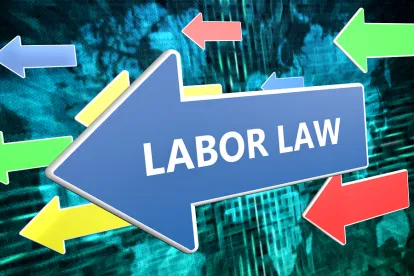-
National Labor Relations Board (NLRB) General Counsel Peter Robb has issued guidance addressing employer assistance in union organizing and decertification elections. In Memorandum GC 20-13 (Sept. 4, 2020), “Guidance Memorandum on Employer Assistance in Union Organizing,” Robb addressed what he viewed as “confusing and contradictory” NLRB decisions related to how much help employers can lawfully give to unions’ organizing campaigns or to employees seeking to withdraw recognition from a union. Employers violate the National Labor Relations Act (NLRA) by providing excessive support to a union attempting to organize its employees or to employees who wish to withdraw from a union. According to Robb, the rationale behind both types of violations is the same: employees are deprived of freedom of choice. However, as Robb observed, the NLRB has applied different legal standards when evaluating the lawfulness of each violation. With respect to employer support for a union’s organizing efforts, the NLRB uses “a totality of the circumstances” standard; but during a decertification campaign, an employer cannot give more than “ministerial aid.” Robb criticized the “totality of the circumstances” standard because it lacks clear guidelines as to what is lawful and unlawful conduct, stating his preference for the “more than ministerial aid” standard because it is stricter and less ambiguous as to whether conduct is lawful. Robb also noted that his office had “seen allegations of impermissible employer support of union organizing activities emerge in the context of pre-recognition neutrality agreements.” He said that lawful neutrality agreements are “truly neutral,” but that others “go beyond neutrality into the area of impermissible support … often contain[ing] provisions that sacrifice the statutory rights of employees for the commercial interests of unions and employers.” Because the standards for review of these agreements have been unclear, extant NLRB law has effectively permitted interference with employee free choice by not carefully examining the provisions of neutrality agreements to determine whether they, in fact, are neutral or provide support to the union. These provisions should be examined through the lens of whether they provide “more than ministerial support” to the union’s efforts to organize. With respect to those agreements, he asks the NLRB to adopt “a simple bright-line test that would find a violation of the Act whenever an employer and union enter into a pre-recognition agreement where: (1) the parties negotiate terms and conditions of employment prior to the union attaining majority status; (2) the parties agree to restrain employee access to Board processes and procedures; or (3) the parties agree to any provision that is inconsistent with the purposes and policies of the Act, such as by impacting Section 7 rights by providing support of the union’s organizing activities, rather than neutrality.”
-
NLRB General Counsel Robb warned that employers cannot use COVID-19 as cover for violations of employees’ NLRA rights. In Memorandum GC 20-14 (Sept. 18, 2020), “Summaries of Advice Merit Determinations Related to Coronavirus Disease 2019 Issues,” Robb outlined cases in which NLRB Regional offices issued complaints against employers for: refusing to bargain over pandemic-related changes to benefits; disciplining workers for raising safety concerns; and allegedly firing an employee who led a workplace protest over PPE. The following are examples of the unlawful conduct addressed in the memo:
-
Employer did not call back 20 known union supporters furloughed in mid-March. According to the General Counsel, the employer called back a dozen other employees who were known to be less enthusiastic about the union and expressed “anti-union animus” during a recent union campaign.
-
A fast food restaurant fired an employee who led a protest over lack of hand sanitizer, masks, and gloves. A group of employees chose to take unpaid leave during the dispute, Robb said, but only two employees — including the organizer of the protest — were told they no longer had jobs when they tried to come back.
-
A casino manager called a meeting to question an employee about wearing a mask in front of guests. After the employee requested a union representative, the manager continued the meeting without one and suspended the employee.
-
For two months, a nursing home operator refused to bargain over a successor agreement, including by teleconference. The employer also allegedly refused to discuss a proposal on hazard pay.
Following the memorandum’s release, an NLRB spokesperson said the Board’s attorneys “have been aggressive and effective in ensuring that workers’ rights are being protected during this difficult time. Today’s memo summarizes just a handful of the many cases in which the Agency is actively protecting workers from discrimination during the pandemic.”
-
The NLRB’s Division of Advice stated that political advocacy related to police reform is not NLRA-protected activity. UFCW 1994 MCGEO, 05-CA-261825 (Adv. Mem. Aug. 13, 2020, released Sept. 14, 2020). In an Advice Memorandum, the Division of Advice concluded the employer did not violate the NLRA by discharging an employee for testifying before a local county council to advocate for police transparency and accountability legislation. The employee worked as a union representative for a labor organization representing uniformed police officers, among others. Following the discharge, the union filed a grievance and an unfair labor practice charge. The Region submitted the case to the Division of Advice, asking whether the charge should be deferred (under Dubo Manufacturing Company) or dismissed. The Division of Advice agreed with the Regional Director that the charge should be dismissed because the employee’s activity, advocacy for police reform, had nothing to do with the terms and conditions of employment with the employer. Rather, the Division of Advice found the employee acted in the interest of the community at large. As a result, such activity was not protected under the NLRA.
-
While election petitions filed with the NLRB have declined during the pandemic, unions assert that workers’ interest in forming unions has stayed steady amid rising unrest. The NLRB reported that 800 union election petitions have been filed since mid-March, which is down from the prior four years when the NLRB processed between 1,100 and 1,400 representation cases over the same period. The sharpest declines came early in the pandemic, but the numbers have steadied recently. In April, only 69 representation petitions were filed. and 125 were filed in May, compared to 213 and 201 in the same months last year, respectively. NLRB data show the agency handled 153 petitions in September, compared to 173 in September 2019 and 145 in September 2018. Meanwhile, some unions report they have maintained a steady organizing pace during the pandemic by adapting to online organizing.
-
The NLRB found more than 16,000 professional interpreters and translators who were members of a professional association were not employees of the association. Registry of Interpreters for the Deaf, 370 NLRB No. 18 (Sept. 11, 2020). The NLRB found a professional association for deaf interpreters did not violate the NLRA by maintaining civility and anti-trust policies that restricted their members from sharing information about their wages, terms and conditions of employment, and views regarding unionization because the relationship with its members was not akin to an employment relationship. The policies applied only to the members, not to the association’s employees, although some members were also employees of an organization related to the association. Contrary to the administrative law judge, who found the policies implicated the NLRA Section 7 rights of the association’s members, the NLRB found the policies covering only members and specifying their rights as members did not violate the NLRA. The members were not employees of the association and therefore did not have Section 7 protections as to the association.









 />i
/>i
